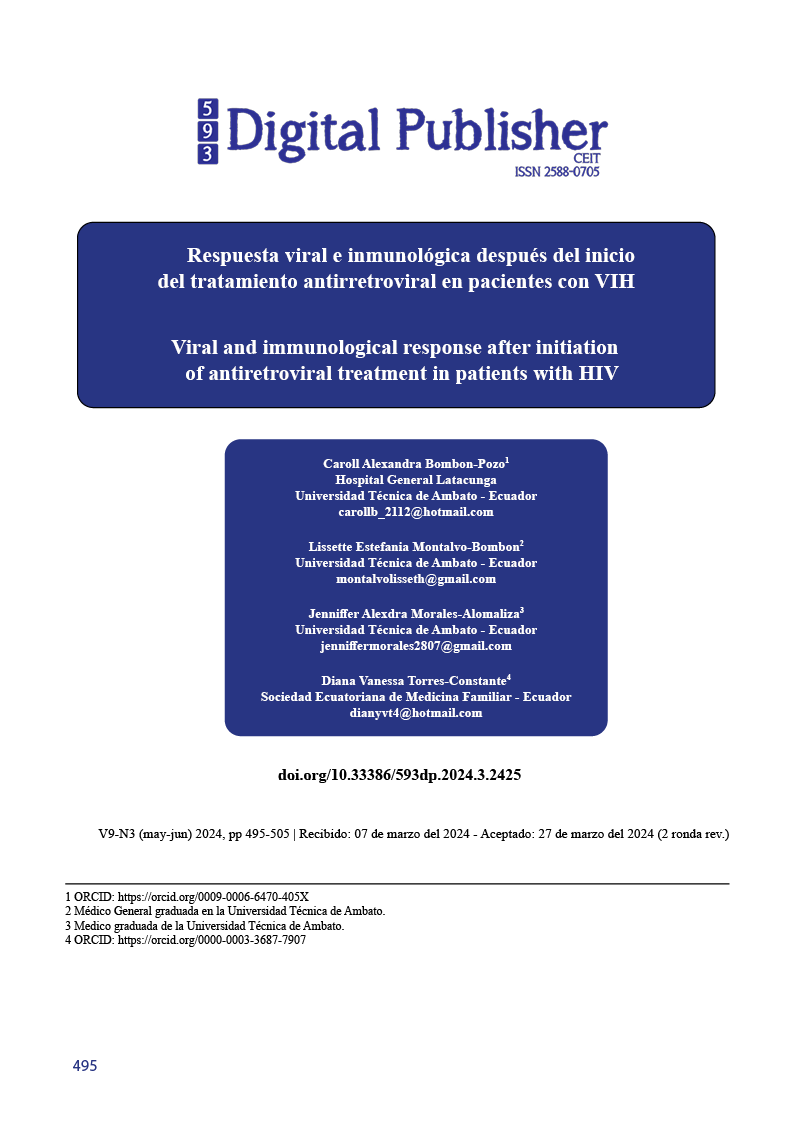Respuesta viral e inmunológica después del inicio del tratamiento antirretroviral en pacientes con VIH
Contenido principal del artículo
Resumen
El virus de la inmunodeficiencia humana (VIH) es una infección retroviral que debilita el sistema inmunológico y que posteriormente va a evolucionar al síndrome de inmunodeficiencia adquirida, el VIH sigue siendo un importante problema de salud pública en todo el mundo. La terapia antirretroviral (TAR) es un método eficaz para reducir la carga viral del VIH y lograr la recuperación inmune (recuento óptimo de linfocitos T-CD4+). La supresión de la carga viral y la recuperación inmune son los primeros objetivos al iniciar el tratamiento. El objetivo del presente estudio fue describir los determinantes de la respuesta inmunológica y virológica al TAR entre personas infectadas por el VIH bajo una revisión literaria. Este estudio se efectuó bajo el diseño del estudio fue revisión bibliográfica-documental, en donde se registró si los participantes recibieron el TAR. Se consideró que los estudios con criterios de selección más estrictos basados, la frecuencia de la monitorización de CD4+ y de la carga viral con el control de asistencia clínica de rutina. Estos hallazgos demuestran que la supresión viral conduce a la recuperación inmune. La adherencia general al TAR entre los sujetos la población de estudio fue buena, infiriendo así una asociación entre la adherencia al tratamiento y el efecto del TAR a partir de los seis meses de haber iniciado el tratamiento.
Descargas
Detalles del artículo

Esta obra está bajo una licencia internacional Creative Commons Atribución-NoComercial-CompartirIgual 4.0.
1. Derechos de autor
Las obras que se publican en 593 Digital Publisher CEIT están sujetas a los siguientes términos:
1.1. 593 Digital Publisher CEIT, conserva los derechos patrimoniales (copyright) de las obras publicadas, favorece y permite la reutilización de las mismas bajo la licencia Licencia Creative Commons 4.0 de Reconocimiento-NoComercial-CompartirIgual 4.0, por lo cual se pueden copiar, usar, difundir, transmitir y exponer públicamente, siempre que:
1.1.a. Se cite la autoría y fuente original de su publicación (revista, editorial, URL).
1.1.b. No se usen para fines comerciales u onerosos.
1.1.c. Se mencione la existencia y especificaciones de esta licencia de uso.
Citas
Ásbjörnsdóttir, K. H., Hughes, J. P., Wamalwa, D., Slyker, J. A., Okinyi, H. M., Overbaugh, J., Benki-, S., Tapia, K., Maleche-obimbo, E., & Rowhani-rahbar, A. (2017). Differences in virologic and immunologic response to antiretroviral therapy among HIV-1 infected infants and children. AIDS, 30(18), 2835–2843. https://doi.org/10.1097/QAD.0000000000001244.Differences
Ceballos, M. E., Rojas, Á., Donato, P., Huilcamán, M., Rivera, G., López, T., Gutiérrez, C., Labarca, J., & Pérez, C. (2016). Respuesta virológica e inmunológica a la terapia anti-retroviral en pacientes portadores de infección por VIH atendidos en una red de salud académica de Chile. Revista Chilena de Infectología, 33(5), 531–536. https://doi.org/10.4067/s0716-10182016000500007
Cohn, L. B., & Deeks, S. G. (2020). The immune response fails to control HIV early in initial virus spread. Journal of Clinical Investigation, 130(6), 2803–2805. https://doi.org/10.1172/JCI136886
De La Mata, N. L., Ly, P. S., Ng, O. T., Nguyen, K. V., Merati, T. P., Pham, T. T., Lee, M. P., Choi, J. Y., Sohn, A. H., Law, M. G., & Kumarasamy, N. (2017). Trends in CD4 cell count response to first-line antiretroviral treatment in HIV-positive patients from Asia, 2003–2013: TREAT Asia HIV Observational Database Low Intensity Transfer. International Journal of STD and AIDS, 28(13), 1282–1291. https://doi.org/10.1177/0956462417699538
Fiseha, T., Ebrahim, H., Ebrahim, E., & Gebreweld, A. (2022). CD4+ cell count recovery after initiation of antiretroviral therapy in HIV-infected Ethiopian adults. PLoS ONE, 17(3 March), 1–13. https://doi.org/10.1371/journal.pone.0265740
Han, W. M., Ubolyam, S., Apornpong, T., Kerr, S. J., Hansasuta, P., Gatechompol, S., Maekanantawat, W., Ruxrungtham, K., Phanuphak, P., Ananworanich, J., & Avihingsanon, A. (2020). Characteristics of suboptimal immune response after initiating antiretroviral therapy among people living with HIV with a pre-treatment CD4 T cell count <200 cells/mm3 in Thailand. Journal of Virus Eradication, 6(3), 100005. https://doi.org/10.1016/j.jve.2020.100005
Jones, J., Sullivan, P. S., & Curran, J. W. (2019). Progress in the HIV epidemic: Identifying goals and measuring success. PLoS Medicine, 16(1), 1–8. https://doi.org/10.1371/journal.pmed.1002729
Kelly, C., Gaskell, K. M., Richardson, M., Klein, N., Garner, P., & MacPherson, P. (2016). Discordant immune response with antiretroviral therapy in HIV-1: A systematic review of clinical outcomes. PLoS ONE, 11(6), 1–21. https://doi.org/10.1371/journal.pone.0156099
Limmade, Y., Fransisca, L., Rodriguez-Fernandez, R., Bangs, M. J., & Rothe, C. (2019). HIV treatment outcomes following antiretroviral therapy initiation and monitoring: A workplace program in Papua, Indonesia. PLoS ONE, 14(2), 1–13. https://doi.org/10.1371/journal.pone.0212432
Mataramvura, H., Bunders, M. J., & Duri, K. (2023). Human immunodeficiency virus and antiretroviral therapy-mediated immune cell metabolic dysregulation in children born to HIV-infected women: potential clinical implications. Frontiers in Immunology, 14, 1–13. https://doi.org/10.3389/fimmu.2023.1182217
Melku, M., Abebe, G., Teketel, A., Asrie, F., Yalew, A., Biadgo, B., Kassa, E., Damtie, D., & Anlay, D. Z. (2020). Immunological status and virological suppression among HIV-infected adults on highly active antiretroviral therapy. Environmental Health and Preventive Medicine, 25(1), 1–9. https://doi.org/10.1186/s12199-020-00881-6
Mendicino, C. C. P., Moodie, E. E. M., Crosland Guimarães, M. D., & Menezes de Pádua, C. A. (2021). Immune recovery after antiretroviral therapy initiation: A challenge for people living with HIV in Brazil. Cadernos de Saude Publica, 37(9). https://doi.org/10.1590/0102-311X00143520
Mounzer, K., Brunet, L., Fusco, J. S., McNicholl, I. R., Dunbar, M., Sension, M., McCurdy, L. H., & Fusco, G. P. (2023). Immune response to ART initiation in advanced HIV infection. HIV Medicine, 24(6), 716–726. https://doi.org/10.1111/hiv.13467
Obiri-Yeboah, D., Pappoe, F., Baidoo, I., Arthur, F., Hayfron-Benjamin, A., Essien-Baidoo, S., Kwakye-Nuako, G., & Ayisi Addo, S. (2018). Immunologic and virological response to ART among HIV infected individuals at a tertiary hospital in Ghana. BMC Infectious Diseases, 18(1), 1–7. https://doi.org/10.1186/s12879-018-3142-5
Reddy, Y., Visalakshi, B., & Kirankumar, P. (2015). Immunological Response of Human Immunodeficiency Virus Positive Patients after Initiation of Highly Active Antiretroviral Therapy. International Journal of Scientific Study |, 3(7). https://doi.org/10.17354/ijss/2015/459
Rumbwere Dube, B. N., Marshall, T. P., Ryan, R. P., & Omonijo, M. (2018). Predictors of human immunodeficiency virus (HIV) infection in primary care among adults living in developed countries: A systematic review. Systematic Reviews, 7(1). https://doi.org/10.1186/s13643-018-0744-3
Sheoran, D. S. K., Devi, D. T. S., Reema, D. N., Singh, D. K. B., N, D. S., Ali, D. A., Narengbam, D. B., & YR, D. K. (2023). To Study the Early Clinical, Immunological and Virological Profile of Hiv Patients on Second-Line Antiretroviral Therapy. Journal of Population and Therapeutics and Clinical Pharmacology, 30(18), 1658–1666. https://doi.org/10.53555/jptcp.v30i18.3324
Thomadakis, C., Yiannoutsos, C. T., Pantazis, N., Diero, L., Mwangi, A., Musick, B. S., Wools-Kaloustian, K., & Touloumi, G. (2023). The Effect of HIV Treatment Interruption on Subsequent Immunological Response. American Journal of Epidemiology, 192(7), 1181–1191. https://doi.org/10.1093/aje/kwad076
Vu, G. T., Tran, B. X., Hoang, C. L., Hall, B. J., Phan, H. T., Ha, G. H., Latkin, C. A., Ho, C. S. H., & Ho, R. C. M. (2020). Global research on quality of life of patients with hiv/aids: Is it socio-culturally addressed? International Journal of Environmental Research and Public Health, 17(6). https://doi.org/10.3390/ijerph17062127
Yildirim, F. S., Candevir, A., Akhan, S., Kaya, S., Çabalak, M., Ersöz, G., Inan, D., Ceren, N., Karaoglan, I., Çakirca, T. D., Balin, S. Ö., Alkan, S., Kandemir, Ö., Üser, Ü., Karabay, O., & Çelen, M. K. (2023). Comparison of Immunological and Virological Recovery with Rapid, Early, and Late Start of Antiretroviral Treatment in Naive Plwh: Real-World Data. International Journal of General Medicine, 16, 1867–1877. https://doi.org/10.2147/IJGM.S393370
Zhang, W., & Ruan, L. (2023). Recent advances in poor HIV immune reconstitution: what will the future look like? Frontiers in Microbiology, 14. https://doi.org/10.3389/fmicb.2023.1236460






